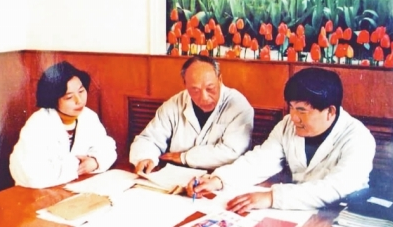Chen Yu won the Sherberry Prize with Eastern wisdom "Let cancer cells change evil"

Wang Zhenyi (middle), Chen Yu (right), and Chen Saijuan (left) are discussing the treatment of acute promyelocytic leukemia. Photo courtesy Shanghai Institute of Blood Research
Recently, the Royal Swedish Academy of Sciences awarded the Shanghai Institute of Hematology (Shanghai Institute of Hematology) Chen Bian Academician Sherberry Award, and also won the award of Anna Deschamps of the Pasteur Institute in Paris, France, and Yu Ke of the French Academy of Paris, France. Dede, in recognition of their contribution to "clarifying the molecular mechanisms of acute promyelocytic leukemia and pioneering revolutionary therapies." Once again, the "China Program" for the treatment of acute promyelocytic leukemia has attracted worldwide attention.
In order to overcome this malignant and relapsed leukemia, after more than 30 years of hard work by four generations of scholars, Chen Yu and his team used the wisdom of the East to "return cancer cells to correct the evil", so that the five-year survival rate of patients reached more than 90%.
"Single soldier combat" to "joint attack"
What forces led the team of Chinese scientists to overcome difficulties? Academician Chen Saijuan, a key member of the team, said that for decades, every difficult counterattack has benefited from the oriental wisdom bred by Chinese culture, especially the dialectical treatment in Chinese medicine theory, the poisoning attack, the compatibility of prescriptions, and the oriental thinking induced by domestication. They are different from the pathological methods of Western scholars in pathological understanding and treatment.
In the late 1970s, the main methods of cancer treatment in the world were surgery and chemotherapy. Leukemia was no exception. Usually, chemotherapy strategies to kill tumor cells were used to achieve therapeutic goals.
Under the leadership of the former director of the Shanghai Institute of Blood Research, Dr. Wang Zhenyi, Chen Hao and his team began to think: "After all the cancer cells are destroyed, is it just a matter of a few genes or a few proteins?"
One of the characteristics of cancer cells is immortalization, while the degree of differentiation and maturation is very low. It is a "very young, very naive cell", and this feature is even worse in leukemia. Therefore, the research team asked, "Is it possible to induce this cell to restore its ability to differentiate and mature, and at the same time inhibit its excessive proliferation." In short, "let the cancer cells change to the evil."
After exploration, in the mid-1980s, the team was fortunate to find a derivative of vitamin A called all-trans retinoic acid, which pioneered the history of all-trans retinoic acid in the treatment of acute promyelocytic leukemia. Great success. However, clinical observations have shown that many patients with this method combined with chemotherapy have recurrence and drug resistance in a few months, and the strategy of “single soldier combat†needs to be adjusted.
Is there a better way to deal with the disease? When Professor Zhang Tingdong of Harbin Medical University learned that arsenic trioxide arsenic was used to treat patients with promyelocytic leukemia, the two teams began to cooperate to further verify and discover the related effects of arsenic and clarify the treatment of acute promyelocytic cells with arsenic trioxide. The mechanism of leukemia.
In order to further improve the therapeutic effect of this leukemia, the Chen Yu team has proposed a method of "cooperative targeted therapy" internationally. After years of hard work, in 2000, Chen Hao and his team used all-trans retinoic acid and arsenic trioxide to treat promyelocytic leukemia, resulting in a five-year survival rate of more than 90%. These results have been confirmed by clinical experiments by domestic and foreign scholars, and the same therapeutic effect can be achieved without chemotherapy. The treatment of all-trans retinoic acid and arsenic trioxide has been unanimously recognized by scholars at home and abroad, and has gradually become the international standard for the treatment of this disease.
"One four academicians" more than 30 years of mentoring relay
In order to overcome the disease, not only does the treatment need to work together, but the research team needs to do the same. Speaking of the collective, the main member of the team, Academician Chen Guoqiang, once said that if the team is like a big tree, the academician Wang Zhenyi can be called the "root" of the tree. Teacher Chen is the "dry" of the tree. They are the tree. The branches are absorbed by the nutrition of several academicians.
In the medical science community, Academician Wang Zhenyi, who won the National Science and Technology Award in 2010, has trained Academician Chen Yu, Academician Chen Saijuan, and Academician Chen Guoqiang, and the "One Four Academicians" has been hailed as a story. At the Shanghai Institute of Blood Research, the masters and apprentices relayed leukemia and passed the Chinese voice to the world.
In 1979, Wang Zhenyi pioneered the concept of “inducing differentiation†in leukemia treatment, attempting to transform cancer cells into normal cells, providing a new path for cancer treatment, and published the first in the international authoritative academic journal Blood in 1988. A clinical application paper on all-trans retinoic acid caused vibrations in the international hematology community.
Two-Piece Baseplate,2 Piece Colostomy Bags Chassis,Ostomy Bags Chassis,Hypoallergenic Ostomy Chassis
Wenzhou Celecare Medical Instruments Co.,Ltd , https://www.wzcelecare.com